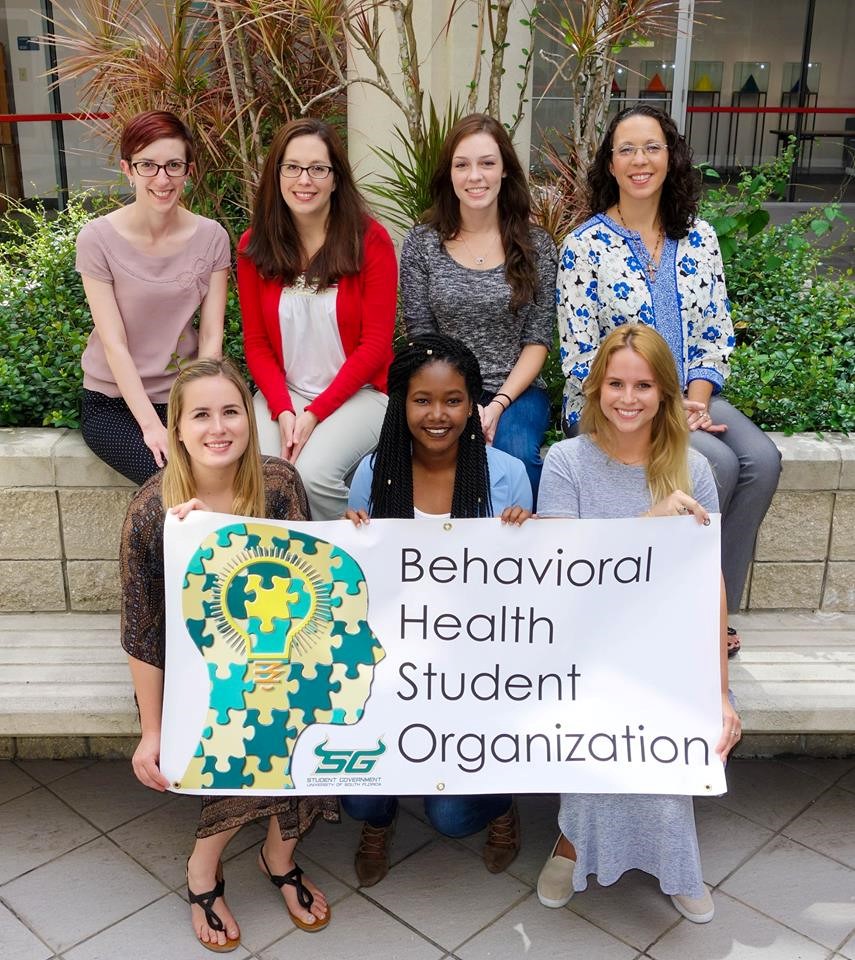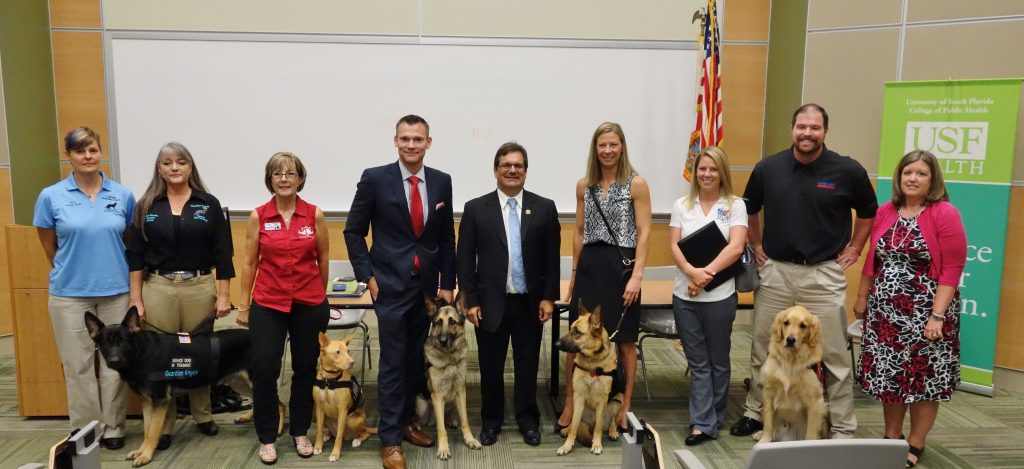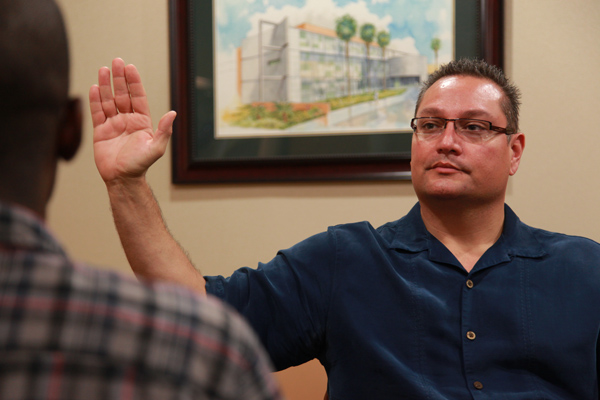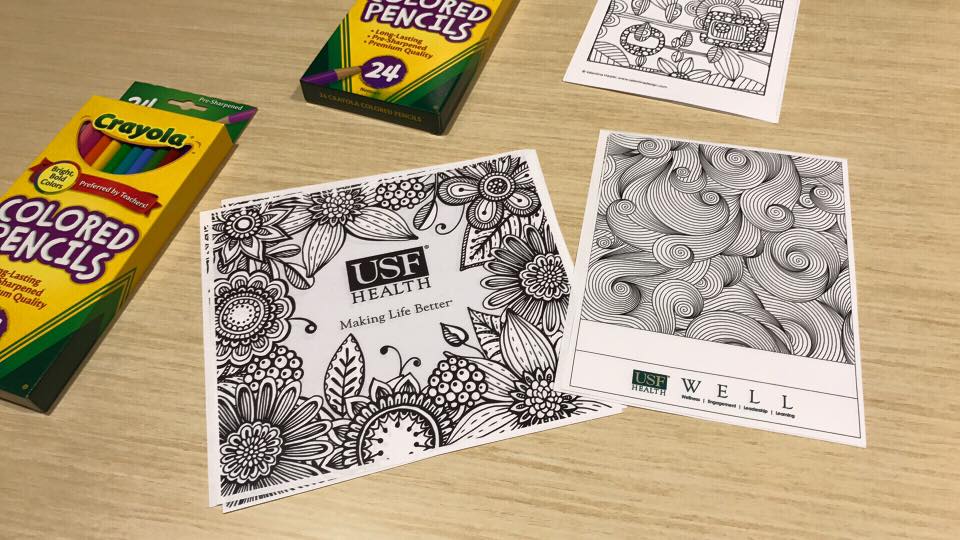Mental health is public health
World Mental Health Day is October 10
The University of South Florida College of Public Health embraces the concept that mental health is public health. To this end, the college offers certificate and full degree programs in support of behavioral health, as well as activities for students and the community.
This year’s World Mental Health Day falls during homecoming week. Bulls and community members can choose from a couple of events that will revive their mental health through hands-on activities and awareness.
Monday – October 9
Living WELL
11:30 a.m.-1:30 p.m.—Health Rotunda
The Center for Wellness, Engagement, Leadership and Learning (WELL) kicks off homecoming with free massages, DIY stress balls, a bath salt bar and more! Attendees can create their own healthy acai bowl and trail mix, pick up this year’s homecoming t-shirt and giveaways!
Tuesday – October 10
Service Day
Noon-1 p.m. and 5-6 p.m. — James A. Haley V.A. Hospital
USF Health unites to make life better! All students and employees are welcome to assist with an ice cream social at the hospital. To sign up, visit http://tinyurl.com/HC2017service.
Wednesday – October 11
Mental Health Awareness Day
4-6 p.m.—Marshall Student Center Amphitheater
The Disaster and Humanitarian Relief Student Collaborative aims to #BreakTheStigma that surrounds mental health. Activities include a poetry slam, giant puzzles, trivia, Jenga and more. Attendees earn stamps for participation and a fully stamped card equals free food! For more information, contact Brian Leenknecht at bleenknecht@mail.usf.edu.
Thursday – October 12
Mindfulness Coloring Lunch
11:30 a.m.-1 p.m.—Health Rotunda
The WELL hosts a zen-filled lunch. Color away the cares of the world in a stress-free and welcoming environment! Lunch will be provided.
Interdisciplinary efforts to train mental health leaders of tomorrow
Public health practitioners should know something about mental health, according to associate professor Dr. Bruce Levin.
Levin, a joint faculty member in USF’s College of Public Health (COPH) and College of Behavioral and Community Sciences (CBCS), said there are a variety of programs to aid in that effort.
“We’re proudly one of the unique universities in the U.S. that has quite a concentration of focus areas and opportunities for students to specialize within a public health degree in behavioral health,” he said. “We’re still only one of two that has opportunities to specialize in behavioral health within an accredited college of public health.”
Degree programs and certificate programs available through each of the colleges include:
COPH – Department of Community & Family Health
MPH – Behavioral Health Concentration
MSW/MPH – Behavioral Health Concentration
MSPH – Behavioral Health Focus
PhD – Behavioral Health Focus
DrPH – Behavioral Health Focus
Graduate Certificate – Translational Research in Adolescent Behavioral Health
College of Behavioral and Community Sciences
MS – Child and Adolescent Behavioral Health
BS – Behavioral Healthcare
PhD – Behavioral and Community Sciences
COPH and CBCS partner on two other initiatives in support of mental health. The Behavioral Health Student Organization serves as a forum for students from either college. Their mission is to educate and increase awareness of behavioral health within the United States and abroad. Through service-learning and volunteer opportunities students are able to network with faculty and community members who are committed to improving the mental health of others, as well improve the well-being of the surrounding community by promoting awareness, compassion, and solidarity.

The Behavioral Health Student Organization is an example of how the CBCS and COPH are working together to create awareness of behavioral health issues. Students are from either college and have an interest in behavioral health, service learning, and promoting awareness, compassion and solidarity on mental health issues. (Photo by Caitlin Keough)
The Institute for Translational Research in Adolescent Behavioral Health (ITRE) offers student scholars a one-of-a-kind education and training program in translational research in adolescent behavioral health. Scholars learn from a team of mentors, participate in graduate courses, conduct a service-learning research project in a community-based setting, present at a national conference, receive funding for courses and program activities, and earn a graduate certificate. The Institute will enroll 12 scholars in 2017-18. The application deadline is November 15, with the program beginning in spring 2018.
For information regarding any of the five behavioral health degree programs or the ITRE, please contact Dr. Bruce Lubotsky Levin at blevin@health.usf.edu.
Translational research
Exploring how service dogs improve the mental health of veterans.
Assessing the mental health needs of adults and children in Hillsborough County.
Raising awareness about infant mental health—social and emotional wellness for children from birth to age three.

In 2016, U.S. Rep. Gus Bilirakis hosted a panel discussion at the USF College of Public Health regarding the use of service dogs for veterans with PTSD and other mental health issues. Pictured are some of the participants and their service dogs.
The aforementioned projects are a sampling of research initiatives in the COPH surrounding mental health and wellness. The most recent project involves using accelerated resolution therapy (ART) to improve the mental health of veterans.
Dr. Kevin Kip, professor in the Department of Epidemiology and Biostatistics, compared the results of 23 homeless veterans and 94 veterans in the community who received treatment for symptoms of post-traumatic stress disorder (PTSD) with a new treatment, accelerated resolution therapy (ART).
“We wanted to see how well the therapy worked in both groups because individuals who are homeless usually have many other life challenges, and we weren’t really sure what the response to the therapy would be for homeless vs. non-homeless veterans,” Kip said.
The study, “Evaluation of Brief Treatment of Symptoms of Psychological Trauma among Veterans residing in a Homeless Shelter by Use of Accelerated Resolution Therapy (ART)” is published in the journal, Nursing Outlook.

Diego Hernandez, visiting assistant professor of the USF College of Nursing, demonstrates a smooth pursuit eye movement technique used in ART (Photo courtesy of USF Health).
Each session covers working through one significant traumatic experience from the past, with the therapy occurring in two phases. The first phase starts with the veteran being asked to just think, not talk, about the original experience, as if they were reliving it in their mind. This technique is called imaginable exposure.
The second phase is called the director phase. During this phase, the veteran is asked to come up with a way in which they would rather remember the traumatic experience.
The session then ends after this phase with the therapist sometimes asking the veteran to envision crossing over a bridge to a new life without the traumatic experience.
Kip’s results showed that for both types of veterans, their level of PTSD symptoms went down substantially and that the comorbidities, disorders that are associated with PTSD, such as depression, anxiety and pain, decreased as well.
“Their overall quality of life was significantly improved in both groups.” Kip said. “These are the kind of advantages we tend to see if you can effectively treat post-traumatic stress disorder.”
The results were what Kip expected, but there was one thing that was surprising to him. On average, even though it wasn’t dramatic, the responses in the homeless veteran population seemed to be a little bit better than the responses for veterans in the community.
Kip believes this may have to do with the fact that the homeless came in with a little more psychopathology, meaning in addition to PTSD, they had other or more severe mental health problems.
He said the only caveat was that only a little more than half of the homeless veterans completed the treatment.
Explanations for not completing treatment with ART tended to be reasons such as the homeless veteran moved away or that they found work somewhere else.
“The reasons didn’t seem to be related to the fact that they weren’t having a good treatment experience; it’s just their life circumstances are difficult and sometimes and they don’t stay long in these types of facilities. It is reassuring to know that it wasn’t that they found the therapy aversive, they just have so many other life challenges,” Kip said. “It’s important to note that if you’re trying to work with the homeless population that the ability to give a full course treatment may be a challenge.”
At the six-month mark, eight of the homeless veterans provided information on how they were doing. They reported strong reductions in their symptoms of PTSD and six of those eight were no longer homeless.
Kip’s other alternative therapy research involves utilizing Brazilian Jiu Jitsu and yoga to improve mental health for veterans and service members. To learn more about these research opportunities, contact Dr. Kevin Kip at kkip@health.usf.edu.
Story by Caitlin Keough, Anna Mayor and Natalie Preston, USF College of Public Health


